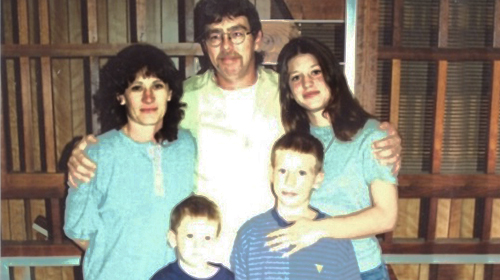
Dad usually suggests we leave a little early because leaving is the ‘elephant in the room’ that we’re all trying to avoid. “Ya’ll go on and head home and get some rest. Don’t worry about me, I’m fine.” It’s the same stuff every time.
My dad is one of 3,278 people who will never come home. He’s one of the thousands who have been sentenced to prison until they die for nonviolent drug or property crimes.
Dad is serving life without parole because he transported and sold methamphetamine to pay for a life-saving bone marrow transplant and other medical treatments for his son, my brother.
I’ve traveled to five different states visiting my father in federal prisons over the last 18 years. Our relationship has consisted of supervised visits heavily laden with rules and regulations and the occasional 15-minute phone conversation. Rather than going out to eat or sharing a meal around a table, we’ve opened bags of chips within earshot of armed guards. Our family pictures are all the same—Dad in some hideous colored jumpsuit while we all try to smile for the camera.
The fact is that Dad’s getting old. He’s only 54, but 18 years in a federal prison has a way of wearing you down and aging you. He takes 7 pills a day, mostly for high blood pressure. Not a single day goes by that I don’t think of my Dad and worry about him. For all I know, he could be dead and it could be some time before I was contacted. The thought of my Dad sitting day after day, hour after hour in a federal prison breaks my heart.
Most pains dull with time. Unfortunately, having a loved one incarcerated is not one of those pains.
How did we get here? Simply put…drugs. My dad received three life sentences and three ten-year charges on top of that. All for a nonviolent offense of drug trafficking. I still remember sitting in the courtroom on that day and hearing Judge McBryde say “life” over and over. I will never forget my mom standing up in the courtroom and screaming “No! You can’t do that! You’re not God! You can’t just take him away.” The overwhelming sense of desperation and sorrow as my mother screamed in that courtroom had such a profound impact on me that to this day I can’t read that part of Dad’s transcripts without breaking down.
The effect of Dad’s decision extends so far beyond the obvious incarceration. Kids need their Dad in their life. At 14 years of age, I was no different. Seeking acceptance, my relationship with my boyfriend became extremely intense. The relationship became abusive and controlling, but I felt trapped. I was finally able to get out of the relationship, but the deep need for acceptance from someone did not flee with the relationship. For many years my relationships seemed to take on the same pattern. Inside I believed I deserved the abuse.
Dad wasn’t there to go to my ball games or see me off on my first date. He missed my graduation and walking me down the aisle. As I’ve gotten older, he’s also missed the birth of my three children.
My children have only known my Dad incarcerated. They have no idea how Dad loves wrestling around on the floor at night or how he would get more excited preparing for our annual Halloween party than me. They only know him as the grandpa in the jumpsuit that lives in prison. When they were younger it was difficult to explain. At 10 and 11 it’s still hard to comprehend the concept of forever. “Papa’s never going to get out?” “Well, we can only pray that something will change,” I keep telling them.
TAKE ACTION: Change is possible for families like April’s. Urge President Obama to use his clemency powers to reevaluate and reduce prisoners’ life without parole sentences for nonviolent offenses.
For more on life without parole for nonviolent offenses – extreme sentencing that is a waste of human life and taxpayer dollars – read the ACLU’s new report A Living Death.
Learn more about prison conditions and other civil liberty issues: Sign up for breaking news alerts, follow us on Twitter, and like us on Facebook.


